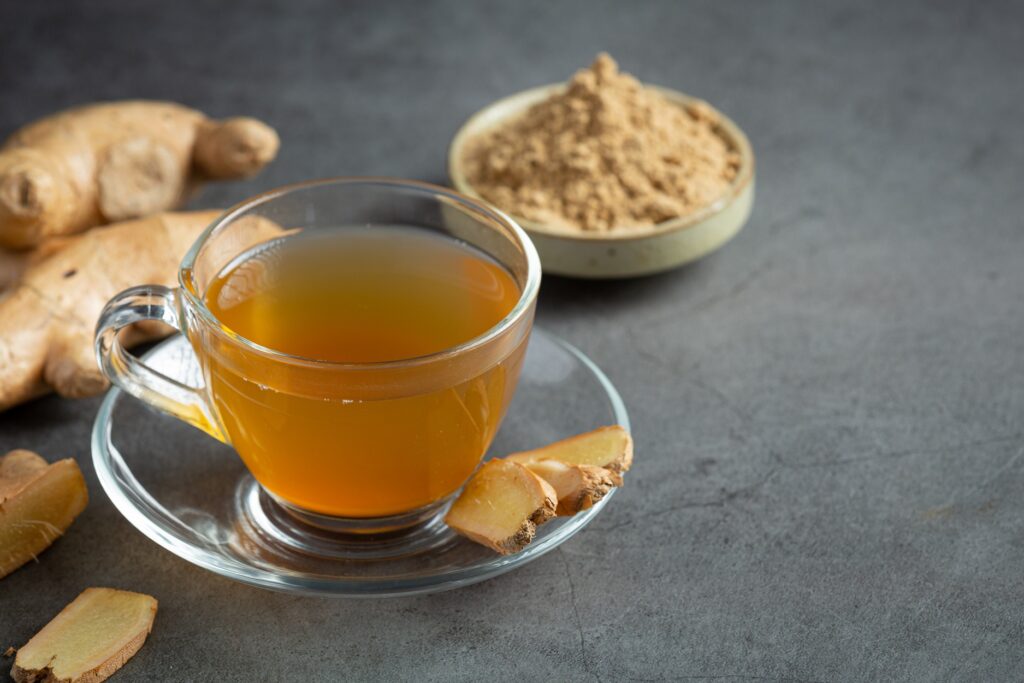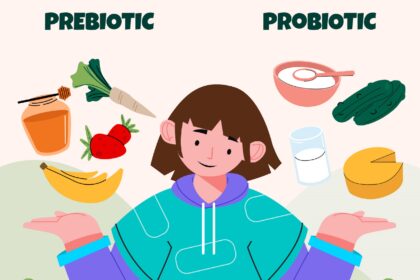Ginger has been used in medicine and cooking since ancient times. Its anti-inflammatory properties may help to reduce nausea and stomach pain, as well as weight loss, manage arthritis, and reduce menstrual symptoms. Additionally, ginger may have antioxidant and anti-microbial properties, as well as anti-viral properties.
In this article, learn 16 proven health benefits of ginger and risk and side-effects allied with ginger.
What Is Ginger?
Ginger is an Asian plant native to India, China, Japan, and other parts of the world. The root of the plant, known as the rhizome or underground stem, is the part that is used for food and medicine. The rhizome of the plant is bulbous, knotted, and has a thin, beige skin. The above-ground part of the rhizome has long narrow green leaves, and flowers that range from white to yellowish green. Ginger is used for both cooking and medicine.

16 Proven Health Benefits of Ginger:
Ginger has been used for centuries to aid digestion and to treat nausea. Traditionally, ginger has also been used to treat colds, flu, and common colds. The natural oils of ginger are responsible for its distinct aroma and taste. The most important of these oils is gingerol, the major bioactive compound present in ginger. Gingerol plays a major role in the medicinal properties of ginger. According to research, gingerol has strong anti-inflammatory, antioxidant and anti-oxidant properties. For example, studies have shown that gingerol reduces oxidative stress.
1. May help with weight loss
Studies in both humans and animals have shown that ginger can help with weight loss. A 2019 review found that supplementation with ginger significantly reduced body weight, waist circumference, and hip circumference in overweight or obese people. Ginger may be effective in weight loss through several mechanisms, such as inflammation. Its thermogenic properties raise the body’s temperature, which helps burn calories.
Additionally, ginger helps regulate insulin levels and improves workout recovery. It’s not a cure-all, but when combined with other weight loss methods, ginger can help you lose weight. However, it’s important to consult with your health professional or nutritionist before making any significant dietary changes, especially if you have any existing health conditions or worries.

2. May lower blood sugar
Gingerol could also explain ginger’s ability to control blood glucose levels, which are important for managing the chronic consequences of type 2. By inhibiting enzymes that break carbs, ginger aids in glucose metabolism. People with type 2 often don’t make enough insulin. Insulin helps keep glucose circulating in the body and prevents it from accumulating in the blood.
In addition, studies have shown that ginger aids in muscle absorption of glucose, without the need for additional insulin. This could have other beneficial side effects, including making it more difficult for Type 2 diabetes patients to lose weight, especially if they’re insulin resistant. An improved blood sugar control could help people lose weight, and it could also make the body more sensitive to insulin.
3. Can help better digestion
If you suffer from indigestion, which is when food doesn’t pass through your stomach as easily as it should, you may experience abdominal pain, bloating, bloating, feeling too full, belching, and feeling sick for no reason. If you suffer from IBS, which is a condition where your bowels don’t work as well as they should, it’s important to add ginger to your diet to help speed up the digestion process and help your stomach empty faster. Ginger may also help reduce or prevent constipation, which is when your bowels can’t digest food as quickly as they should. It also seems to have a positive effect on your digestive enzymes, which help your small intestine digest food.
4. Supporting the immune system
Ginger is commonly used to treat cold and flu. It was found that fresh ginger protects the respiratory system, while dried ginger has no effect. The miracle of ginger lies in the bioactive compound found in the raw root, gingerol. This compound increases immunity with its antibacterial and antifungal properties. It is also high in antioxidants and anti-inflammation properties. The combination of the two compounds has many health advantages. It improves coughs, reduces fevers, fights infections, relieves headaches, and relieves other common cold/flu symptoms. When you eat ginger, it strengthens your body’s defenses, making you better prepared to face life’s challenges.

5. Alleviates PMS symptoms
Menstrual pain is one of the most common symptoms of PMS, but with the active compounds in ginger, it may help ease some of the discomfort and bloating that many women experience. The natural soothing properties of ginger may also help to reduce mood swings and irritation associated with PMS, as it promotes a sense of calmness and relaxation. However, it is important to consult with your health care provider before making any major dietary changes. Ginger tea may help treat menstrual pain, also known as dysmenorrhea.
6. Relieving pain
Ginger is one of the most effective natural pain killers in the world. It can help with muscle soreness, arthritis, and many other conditions. Arthritis is often treated with anti-inflammatory medications. But ginger is a great natural alternative to these drugs. Gingerol is a powerful compound found in fresh ginger. It helps to reduce inflammation and pain in the body. It also helps to prevent arrhythmia and analgesia. Moreover, it can inhibit pain signals within the brain. In addition, it has antioxidant properties and reduces the number of enzymes that produce anti-inflammatory substances. For example, a clinical trial found that dried ginger was effective in relieving knee pain related to osteoarthritis.
7. Can help with osteoarthritis
Ginger may help reduce joint pain and disability, according to one review. The study involved participants who had been diagnosed with osteoarthritis of the knee, which is a degenerative condition that causes pain and stiffness in the joints. The participants took between 0.5 and 1 gram of ginger daily for 3 to 12 weeks (depending on the study). However, many stopped taking the ginger because they didn’t like the taste or stomach upset.
8. Relieving nausea
Nausea side effects can be relieved by consuming ginger. Whether you’re experiencing motion sickness, migraines, morning sickness, or just stomach pain, ginger helps settle your stomach. Ginger’s bioactive compounds block the signals that trigger nausea and vomiting in the brain. These signals are sent from the serotonin receptors in your gut lining. By blocking the serotonin receptors, ginger blocks the nerves that trigger your vomiting reflex.
There are many ways that ginger can help reduce nausea. It can improve food motility, blood pressure in your gastrointestinal tract, and reduce nausea after chemotherapy. If you’re not pregnant, it’s generally safe to eat ginger. However, if you’re close to labor, have had an abortion in the past, have vaginal bleeding, or have a clotting disorder, you should talk to your doctor.
9. Supporting cardiovascular health
Ginger has anti-inflammatory properties that help protect against cardiovascular disease. In addition, ginger acts as a blood thinner, which can help prevent cardiovascular issues. A blood thinner reduces the risk of a blood clot, which lowers the risk of a heart attack or stroke. Ginger also lowers blood pressure, which helps to prevent heart disease. Lipid metabolism is also improved by ginger, which helps to break down fats in the blood. This helps to maintain healthy cholesterol levels, and prevents the buildup of plaque in arteries. It also improves circulation, lowering blood sugar levels, which helps to keep the heart performing optimally.
10. Healthier skin
Ginger is known for its beauty benefits, which include its antioxidant properties, blood circulation, antiseptic properties, and more. Its essential vitamins and minerals help keep your skin hydrated and nourished. Ginger’s antioxidants help protect your skin from UV rays, while its antiseptic properties slow down the breakdown of collagen and make your skin look more youthful and supple. It also brightens your skin by stimulating blood circulation, giving your skin a healthy glow. Its antiseptic properties can help reduce acne symptoms, and raw ginger can be used to treat acne scars. Its anti-inflammatory properties can help heal irritated skin.

11. May help lower cholesterol levels
High LDL cholesterol is associated with heart disease. A study of 26 trials found that consuming ginger reduced LDL cholesterol and raised HDL cholesterol significantly, even at doses of less than 1,500mg daily. However, adding such a high dose to your diet can be challenging, especially if you dislike the taste of ginger. For instance, one study found that people taking daily ginger pills had lower triglycerides and lower total cholesterol, as well as lower LDL cholesterol, after 45 days, compared to those taking placebo. However, further research is needed before we can say for sure that taking ginger can reduce cholesterol.
12. May help reduce cancer risk
Ginger is known to have anti-cancer benefits due to its antioxidant and anti-inflammatory properties, such as gingerol. Studies have shown that ginger may reduce the risk of colorectal cancer and pancreatic cancer. Additionally, studies have shown that some of the anti-cancer benefits of ginger may help prevent some types of cancers, such as ovarian, colorectal, and pancreatic cancers. Ginger can also be used as an alternative to traditional cancer treatments, such as chemotherapy, as it can help reduce nausea and pain associated with the treatment. Although it is not a cure for cancer, incorporating ginger into your daily diet may be beneficial in addition to traditional medical treatments.
13. Can help fight infections
Because of its antimicrobial properties, ginger may be effective against a variety of infections caused by bacteria and fungi. Laboratory studies have indicated that ginger may be able to inhibit the growth of certain bacteria, such as Staphylococcus and Escherichia coli, both of which cause intestinal infections, and Candida albicans, which can cause fungal infections in your mouth, vagina, etc. Some studies have suggested that certain elements in ginger (e.g. gingerol) may also have antibacterial properties. However, further research is needed to make these claims.
14. Reducing inflammation
The anti-inflammatory properties of ginger, as one of the benefits of ginger. Several of the active ingredients in ginger can help reduce inflammation. For example, some studies have shown that ginger can reduce pain in people with “Osteoarthritis” (which is the most common type of arthritis caused by the breakdown or damage of joint cartilage).
15. Protection of brain health
Some studies suggest that the compounds in ginger (6-Shogaol, 6-gingerol, etc.) may protect against diseases like Alzheimer’s, Parkinson’s, and Multiple Sclerosis (MS). Oxidative stress and chronic inflammation may be the primary causes of Alzheimer’s disease and age-related cognitive decline. Ginger’s anti-inflammatory and antioxidant properties may help protect the brain from oxidative stress, which has been proven by scientific research. In particular, antioxidant properties of ginger have been found to reduce oxidative stress and inflammatory markers.
If you like the flavor of ginger tea, then you should add it to your diet. It is rich in vitamins and minerals, anti-inflammatory, anti-nausea, and more. Taking ginger on a regular basis may help prevent neurodegeneration – the deterioration of brain functions as we age.
16. Source of vitamins and minerals
Drinking ginger tea on a regular basis can help you get your daily intake of essential minerals and vitamins. According to studies, ginger is rich in vitamins and minerals, including: Vitamin C, Vitamin B6, Magnesium, Potassium, Copper, Manganese, Fiber, & Water.
Vitamins are essential for your body’s growth and function. For example, vitamin C helps your body absorb iron, keep your tissue healthy, and heal wounds. Vitamin B6 helps your body make red blood cells and keeps your brain healthy. Magnesium is involved in more than 300 of your body’s biochemical reactions, including nerve and muscle functions.
Risks and side-effects of ginger use:
The Food and Drug Administration (FDA) has approved ginger for human consumption, but that doesn’t mean it’s safe to use as a medicine or supplement. A lot of the compounds in ginger haven’t been studied by scientists, and there isn’t much scientific evidence to back up claims about ginger’s healing properties. Therefore, it’s best to talk to a doctor before adding any ginger to your food or supplement. Some supplements can mess with medications or cause other health problems.
According to studies, ginger can be consumed in moderate amounts in most people’s diets. Higher doses, such as those found in dietary supplements, can raise the risk of bleeding. For people with diabetes, moderate amounts of ginger can be eaten in food, but large doses should be avoided. Other possible side effects include: Abdominal upset, Heartburn, Diarrhea, Irritation in your mouth and throat
How to add ginger to your diet?
Ginger is one of the easiest ingredients to incorporate into your diet, and for good reason. A small amount can make a big difference. Fresh ginger has a spicy-sweet flavor, and dry ginger has a more pungent flavor. You can get ginger in three different forms: fresh, dried, or powdered. You can also take the root and grind it yourself to the desired consistency. You can find ginger in a few different forms at your local grocery store.
You can get it in the root form, dried, pickled, or as a tea. You can also get ginger shots. If you’re looking for a way to relieve inflammation or nausea, ginger tea might be a good option. However, another common liquid, ginger beer, can have too much sugar in it, which can be dangerous if you’re dealing with an inflammatory condition such as arthritis. Instead, drinking ginger tea is best option, which has no added sugar.
Conclusion:
Some studies suggest that ginger can improve digestive health, decrease inflammation, and reduce pain, among other health benefits. However, these studies often tested very high extracts. Therefore, a person may not experience any positive health effects from adding more ginger to his diet. Other studies investigating the health effects of ginger have been limited or inconclusive. Adding ginger to your diet is easy (and delicious). If you have a heart condition, poor digestion, are overweight, or just want to improve your health, adding ginger has you covered.
Reference used:
https://www.healthline.com/nutrition/11-proven-benefits-of-ginger
https://www.medicalnewstoday.com/articles/265990
https://spiceworldinc.com/health/10-health-benefits-of-ginger/
https://health.clevelandclinic.org/ginger-health-benefits
https://www.forbes.com/health/nutrition/ginger-tea-benefits/





